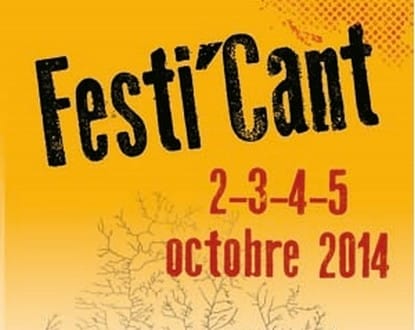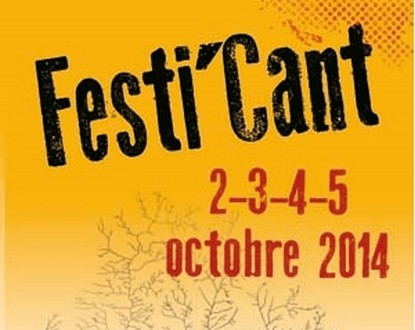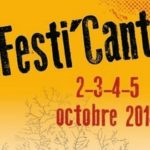This Traditional Singing Festival of the Paillon Valleys, organized by Alp’harmonia (Ràdio Nissa Pantai as a partner) will take place on October 2, 3, 4, and 5 in Touët de l’Escarène, Peille, Contes, and Peillon.
 The program is rich with events, starting with…
The program is rich with events, starting with…
This Thursday, October 2, in Touët de l’Escarène
at 7:30 PM Goustada offered to the public and at 8:30 PM in the village church, the program includes a concert* of Latin and Provencal and Sardinian songs by Renat Sette with Elva Lutza and Ester Formosa.
Friday, October 3, in Peille
at 7:30 PM Goustada offered to the public; 8:15 PM Vocal journey through the village streets; at 9:00 PM in the village church, concert with: Alinéa 4 and Nagy Nike, Elisabeth Canellas, and Anne Latz.
Saturday, October 4, in Contes at 8:30 PM in the “Théâtre de l’Hélice”, concert* with: Taca d’Òli, qu’es aquò? An ensemble of popular polyphonic songs dedicated to the repertoire and singing style of the Nice region.
Sunday, October 5, in Peillon at 4:00 PM Vocal contest hosted by Richard Cairaschi and the groups Stoufa Gari and Rauba Capèu, followed at 5:00 PM by Balèti with the group Rauba Capèu and festival closure at 6:30 PM with Goustada and Balèti.
*The “Latins”, a female vocal group composed of three singers. This ensemble works on songs from the traditions of Nice, Provence, Piedmont, and Italy with personal arrangements for some. Its goal: to offer the public powerful emotional moments through sacred, popular, and festive songs.///Renat Sette, a singer from Haute Provence, Elva Lutza, a recently formed Sardinian duo, invite Catalan singer Ester Formosa. Renat Sette sings a cappella, participates in several musical groups from Mediterranean countries. Elva Lutza blends traditional music and jazz improvisations … Ester Formosa travels through traditional songs and poetry and invites us to a collaborative dialogue between voice and music. Openness, crossbreeding, and friendship have brought them together and provide a fresh breath to traditional music.
Three women, three temperaments who sing about the land, that of their origins and that of adoption since 2001. They trust each other, they share their doubts, and ally when it comes to creating a song to offer. The songs speak of Love, Friendship, rebellion, anger… in short, of life, the life lived and the imagined life, full of hope and light.///Chet Nuneta sings the history of others as it is also their own. As long as the emotion rings true. They have no limits, no papers. As long as the musical images make them travel, they mix instruments and styles. They compose, arrange and sing in all languages. Their only legitimacy is their sensitivity and imagination. Freed from traditional frameworks, transitioning from acoustic to very modern sounds, they transcend genre boundaries to offer us an unclassifiable music populated by numerous ethnicities and cultures that nevertheless refer us to our own intimate singularity.
*10 years of existence under the direction of Françoise Marchetti. Taca d’Òli is one of the “children” of the traditional music workshops of Cedac. Friendliness and the pleasure of “singing together” that spills over … Barbara Furtuna remains faithful to the spirit of Corsican singing while infusing it with her own vision of the world through original creations. The group has managed to conquer an international audience through its art without ever being confined to a single register, participating in numerous projects with artists from diverse backgrounds. Today, the quartet has found its own sound identity and offers a show that reflects its image: curious about this rapidly changing world while attentive to the destiny of this island.
Stoufa Gari: It is around the traditional cultures of Nice, Provence, and Occitan regions that the vocal ensemble Stoufa Gari has been built since June 2011 under the impetus of Arnaud Galichet: six young people from Nice and the Nice valleys. Their repertoire evolves between tradition and more distant roads, from Nice to the Piedmontese Alps, from Italy to Croatia, passing through Provence and Flanders. There are many arrangements specific to them, and a good dose of originality.
///Lu Rauba Capèu: Since 2006, Lu Rauba Capèu has been blending new sounds, traditional airs from the Southern Alps, and original compositions. The clearly stated ambition of the group is to bring everyone together around the festivity and the Balèti, to the sound of diatonic accordions, fife, drums, voice, percussion, and saxophone. With enthusiasm, the group draws its energy and inspiration from the cultures and characters that have shaped the identity of the Countéa de Nissa and hopes thereby to create a link between roots and new generations. This year marks the release of their latest album “S’en tournon”.



